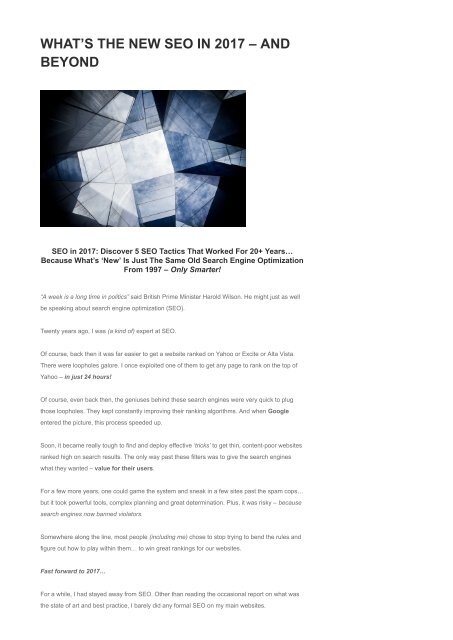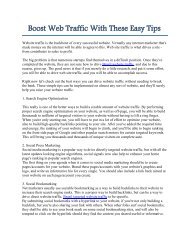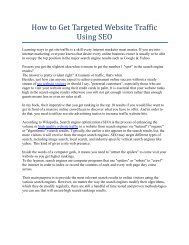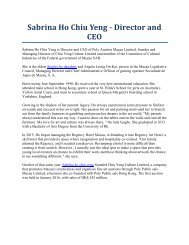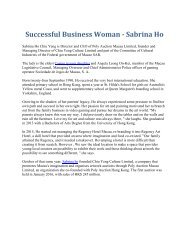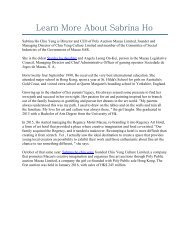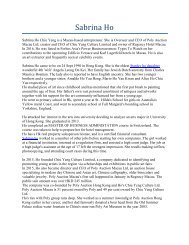Search Engine Optimization Tips In 2017
A comprehensive and up-to-date guide to SEO in 2017. Learn exactly what works for SEO in 2017 - and what doesn't. Stop wasting time on outdated SEO tactics. Focus just on these 5 top SEO tips - and win
A comprehensive and up-to-date guide to SEO in 2017. Learn exactly what works for SEO in 2017 - and what doesn't. Stop wasting time on outdated SEO tactics. Focus just on these 5 top SEO tips - and win
You also want an ePaper? Increase the reach of your titles
YUMPU automatically turns print PDFs into web optimized ePapers that Google loves.
WHAT’S THE NEW SEO IN <strong>2017</strong> – AND<br />
BEYOND<br />
SEO in <strong>2017</strong>: Discover 5 SEO Tactics That Worked For 20+ Years…<br />
Because What’s ‘New’ Is Just The Same Old <strong>Search</strong> <strong>Engine</strong> <strong>Optimization</strong><br />
From 1997 – Only Smarter!<br />
“A week is a long time in politics” said British Prime Minister Harold Wilson. He might just as well<br />
be speaking about search engine optimization (SEO).<br />
Twenty years ago, I was (a kind of) expert at SEO.<br />
Of course, back then it was far easier to get a website ranked on Yahoo or Excite or Alta Vista.<br />
There were loopholes galore. I once exploited one of them to get any page to rank on the top of<br />
Yahoo – in just 24 hours!<br />
Of course, even back then, the geniuses behind these search engines were very quick to plug<br />
those loopholes. They kept constantly improving their ranking algorithms. And when Google<br />
entered the picture, this process speeded up.<br />
Soon, it became really tough to find and deploy effective ‘tricks’ to get thin, contentpoor websites<br />
ranked high on search results. The only way past these filters was to give the search engines<br />
what they wanted – value for their users.<br />
For a few more years, one could game the system and sneak in a few sites past the spam cops…<br />
but it took powerful tools, complex planning and great determination. Plus, it was risky – because<br />
search engines now banned violators.<br />
Somewhere along the line, most people (including me) chose to stop trying to bend the rules and<br />
figure out how to play within them… to win great rankings for our websites.<br />
Fast forward to <strong>2017</strong>…<br />
For a while, I had stayed away from SEO. Other than reading the occasional report on what was<br />
the state of art and best practice, I barely did any formal SEO on my main websites.
The momentum from past optimization lasted a good 4 or 5 years before dwindling. By early<br />
<strong>2017</strong>, however, traffic had slowed to a trickle. Websites that had once ranked at or near the top<br />
on a Google search were now only found on page 3 or 4 or beyond.<br />
And so I decided to get to work and fix things.<br />
With a vengeance, I hunted out the best resources on SEO in <strong>2017</strong> and studied them eagerly.<br />
You see, I was looking for something new. The secret sauce that worked like magic in <strong>2017</strong> – and<br />
would continue to work for at least a few years more.<br />
But although I covered most of the current and updated guides, reports and ebooks, it was<br />
disappointing… because there was nothing new in them.<br />
<strong>In</strong> fact, the more I learned about what’s effective in SEO today, the stronger was my realization –<br />
that what the experts say works best now is almost exactly what I had done 20 years ago!<br />
Before the ‘tricks’ and ‘loopholes’ – that search engines fixed.<br />
Before the gimmicks and shenanigans – that they caught on to.<br />
Before anyone had even heard about me or my passionate purpose.<br />
Right back when I first got started online – with just 8 visitors a month, and gradually grew to over<br />
8,000 per day!<br />
History Repeats Itself<br />
Back in the day, I had no idea what SEO was. Heck, I had little idea what ANYTHING online was.<br />
With the aim of sharing something of value with others, I built a website on Geocities.com (and<br />
later bought my first domain names). Added content to it. Tried different methods to inform people<br />
about it. And by time consuming trialanderror, hit upon ways that worked (and many that didn’t!)<br />
And it was somewhat startling to realize that the methods that were successful in getting my<br />
website ranked well in 1997 are the very same ones that specialists in SEO recommend even<br />
today!<br />
So it seems as if the more things change, the more they remain the same!<br />
Let’s talk about these broad principles that, surprisingly, continue to be effective even two<br />
decades later.<br />
Deliver value<br />
Get recognized for that value<br />
Do it strategically to keep growing in value
What Works for SEO in <strong>2017</strong><br />
… And Things to Avoid for SEO in <strong>2017</strong><br />
Be THE Expert<br />
It’s the backbone of all effective SEO – yet nobody talks much about it. Just think about this for a<br />
moment…<br />
If you don’t have a clue what you’re talking about, why should other people listen?<br />
SEO aims to get your website and content ranked well on Google and other search engines, so<br />
that many more people will see it. Unless you deliver superior quality and value, why would they<br />
want to?<br />
That’s why you should be an expert.<br />
It’s the foundation of all good SEO strategy. When I built my first website on heart disease, I had<br />
already been studying the subject for over ten years.<br />
I was a specialist. My website shared that expertise. So SEO was easy.<br />
My content was top class. It offered great value. Many people liked it. They linked back to it.<br />
<strong>Search</strong> engines noticed, and ranked it higher. Easypeasy!<br />
Be THE expert.<br />
Sadly, There Are No Shortcuts<br />
What’s that I hear you say?<br />
You: “But that takes time.”<br />
Me: Of course it does. So get started right away.<br />
You: “Can’t I just fake it till I make it?”
Me: Sure. But today, Google’s memory is getting better. If you try sneaky tricks and get<br />
caught, it’s infinitely harder to get a second shot. The barely spoken of (but widely<br />
acknowledged) “people rank” algorithm is rating YOU on several factors.<br />
And if YOU qualify for the label of “bad neighbor”, everything linked to you gets tarnished.<br />
You: “But I don’t want to wait for years and years!”<br />
Me: Begin with something you already know about. And keep improving your skills,<br />
knowledge and experience. That’s the only reliable way to get great results with SEO in <strong>2017</strong><br />
– and beyond.<br />
Backlinks Rule… But HOW You Get Them Matters<br />
Getting links to your website is just as important in <strong>2017</strong> as it was in 1997. And the best<br />
backlinks are the ones you EARN.<br />
Back in the “good old days”, there weren’t that many websites around. Surfing the Web was a<br />
favorite pastime. Finding gems in the rough was exciting. If I thought a website was fun, inspiring,<br />
or taught me something new, I’d link to it from my site – and shoot the owner a quick email to say<br />
so.<br />
The guy or gal who built the site would be so curious to see who was the cool, smart, classy<br />
person who recognized their true genius, that many would pop over to my site to take a look. If<br />
they liked it, too, they’d link back to me – and tell me about it.<br />
A backlink was a vote for quality.<br />
Better websites got more backlinks. <strong>Search</strong> engines rewarded this by ranking them higher. It was<br />
a virtuous, selfpropelling upward spiral.<br />
Sneaky, Shitty SEO<br />
And then, a new era in SEO dawned. It was ushered in by sneaky thinkers. They owned shitty<br />
websites, but wanted to rank them higher on search results. So they came up with a devious plan.<br />
They contacted webmasters of other shitty websites. Offered to link to them, in exchange for a<br />
link back from them.<br />
They got lucky. Often. Y’see, there were always many owners of shitty websites who wanted<br />
more traffic.<br />
Soon, a backlink was no longer a vote for quality. It was just pay back for a link the other way.<br />
And Google caught on quickly. Reciprocal backlinks were downgraded first, then frowned upon,<br />
and later punished. Folks tried twists on the scam.<br />
Triangular linking.<br />
Link chains.<br />
Web rings.<br />
And later, entire PBNs (private blog networks).
Each was uncovered, busted and slapped by the big G. Today, an “I’ll link to you if you’ll link back<br />
to me” strategy is almost SEO suicide!<br />
Tim BernersLee, founder of the WWW, once called hyperlinks the “lifeblood of the World Wide<br />
Web”. Sneaky thinking to cheat shitty websites into top ranks on SEs wrecked one of the most<br />
powerful elements of the <strong>In</strong>ternet.<br />
But guess what…<br />
Earned Editorial Backlinks STILL Work<br />
What has changed over the last 20 years (out of necessity) is that certain kinds of backlinks have<br />
been devalued.<br />
links that are bought for a price<br />
spammed links from irrelevant sites<br />
links from low quality sites<br />
links that are exchanged<br />
overoptimized links that are clearly artificially acquired<br />
If you pay for a backlink, or create them (even in bulk using automation software) on properties<br />
you own or rent, swap them with fellow webmasters or engineer them to include specific keyword<br />
terms and phrases, Google WILL find you out – and either downgrade the impact/value of those<br />
links, or even punish your efforts to game their system.<br />
But the pristine beauty of a once innocent Web is still retained.<br />
When you publish a stellar piece of content that other people want to link to (like this one<br />
you’re reading now!), Google will reward you richly with a higher ranking on SERPs (search<br />
engine results pages).<br />
Your challenge, then, is to<br />
create great content<br />
spread word about it (marketing)<br />
make sure people link to it and tell others about it<br />
Once you master this skill (and it is an art form, one worth learning), you’ve cracked the secret<br />
code of effective SEO in <strong>2017</strong> and beyond.<br />
You’ve earned those links – by delivering value.<br />
That value is recognized by the search giant – as worth sharing with its users.<br />
You’re rewarded with a higher search ranking.
But…<br />
How can Google tell that a backlink is earned?<br />
Great question.<br />
Apart from the fact that Google’s tentacles extend “everywhere” online and can monitor almost<br />
anything you say, write, do (and maybe even think!) online, it relies on some commonsense<br />
patterns and rules to help make the decision.<br />
Earned backlinks are, in general:<br />
from relevant, related websites – why would a sports news website link to your article about<br />
ancient Roman architecture?<br />
from resources it considers “Authority sites”, based on past performance (which Google<br />
has been monitoring for years – remember ‘People Rank‘!)<br />
from actual websites with visitors and regularly updated content, not merely “set up for<br />
backlinking” profiles or pages<br />
diversified in anchor text – I mean, it isn’t natural for 100 websites to all link to your article<br />
with the same word string, is it?<br />
from “good neighborhoods” – not the slimy, shady, smelly corners of the Web where dirty<br />
deals are closed<br />
Now, before you say: “Ha! So if THAT’s how Google decides, I think I can figure out a way to…”<br />
STOP Trying to Game Google<br />
Google knows. Everything.<br />
Just ask any kid or teenager. They’ll tell you. Whenever they have a doubt or question, they don’t<br />
run to Mom or Dad or Coach or teacher for the answers any longer…<br />
They pull out their smartphone and pull up Google to ask.<br />
Why?<br />
Because Google KNOWS.<br />
You think just because you can hide your PBN domains on different Class C IPs hosted on a slew<br />
of SEOhosting accounts across geographies and use unique themes, proxies, writing styles and<br />
languages to “eliminate your digital footprint”, you’ll now be able to load up your high PR network<br />
with powerful backlinks to rocket your website to the top of Google?<br />
Yes?<br />
Bzzz…. WRONG answer.<br />
Ain’t gonna work no more.<br />
Listen, I’ve tried these tricks before. But that was over ten years ago. Even then, they only worked<br />
for a while.
Today? Fuggedabaoudit!<br />
It’s growing increasingly harder – and costlier – to maintain a truly anonymous private blog<br />
network. And risker, too. When your network is busted, all your hard work goes down the drain.<br />
If you still want to go with that plan, good luck.<br />
You’re going to need it!<br />
The wiser heads reading this will realize that party’s long been over – and that it’s time to buckle<br />
down and focus on REAL SEO in <strong>2017</strong>.<br />
Oh, and while we’re talking about stuff that’s no longer worth trying to fool Google (and other<br />
search engines like Bing), here’s a few more:<br />
do follow blog comments, especially when they’re from spammy/spammed blogs with<br />
massive numbers of OBLs (outbound links), all with keyword anchortext<br />
links in blog footers and sidebars<br />
automated backlinks generated using any kind of software<br />
All these tactics had their heyday. Back in the 90’s and early 00’s. They’re over now.<br />
Feel a tinge of nostalgia about them, if you like. But then, move on. It’s not worth lingering over<br />
those memories any longer!<br />
Relevance Matters – a LOT<br />
An important twist (but one that’s not really surprising) is how valuable Google considers<br />
“relevance” of a site from which you acquire backlinks.<br />
Remember your website on ancient Roman architecture?<br />
While you won’t get much credit for a link to it from a sports news portal, what will earn you<br />
brownie points from the Big G is a link from History.com or Architecture.com or the Ancient<br />
History Encyclopedia – sites that Google already considers respected authorities on the subject.<br />
Here’s what’s even more interesting.<br />
A link back to your Roman architecture website from even a lower ranked and relatively unknown<br />
site on architecture – such as Alan Reed’s painting blog at alanreed.com or Legends &<br />
Chronicles at legendsandchronicles.com – would be worth MORE than a similar backlink from<br />
ESPN.com or SkySports.com<br />
How can a link from a page with DA (domain authority) and/or PR (page rank) so high up in the<br />
stratosphere be worth less than one from such an insignificant one?<br />
The magic key is RELEVANCE.<br />
Even a casual hobbyist fascinated with the times of Caesar, Spartacus and Hadrian will be a<br />
better judge of “value” when it comes to Roman architecture – than the world’s best sports site<br />
editor.
It’s commonsense. And that’s the secret sauce of Google’s ranking algorithm, too.<br />
What’s more, it’s also natural for a website on a theme to link out to other quality sites on the<br />
same (or related) theme.<br />
Don’t Sacrifice Caution For Relevance<br />
Getting relevant backlinks is the cat’s whiskers for SEO in <strong>2017</strong>.<br />
But don’t throw caution to the winds and rush in blindly. There are still pitfalls to high ranking. And<br />
some popular SEO tactics fall into the “risky, even if they work” category.<br />
One of them is buying expired domains with relevant topical Trust Flow – and redirecting them<br />
to your site. Finding them is tough. But if you’re watchful (and lucky!), you might catch a break.<br />
Building themed properties on Web 2.0 sites like Tumblr, WordPress.com, HubPages, Weebly<br />
and RebelMouse for the specific purpose of linking back to your domain on the same theme was<br />
once smart – but today opens you up to the possibility of a manual penalty.<br />
SEO practices that fall under the heading of Gray Hat Backlinking are all somewhat risky in<br />
<strong>2017</strong>. They work, but no one can tell for how long. And they all expose you to the danger of being<br />
judged a “bad neighbor”.<br />
Is that a chance you’re ready to take?<br />
You decide.<br />
Is Your SEO Ready for <strong>2017</strong> – and beyond?<br />
Read "SEO in <strong>2017</strong>" Go here now: click<br />
The latest post on my blog is a WHOPPER but one you'll want to check out if you have a<br />
website, blog, online store or want more people to see what you're doing.<br />
It's about SEO in <strong>2017</strong> and covers ALL effective techniques, secrets and tips to get your website<br />
ranked #1 on Google... for as long as you want!<br />
You can read it here for FREE!<br />
"What's The New SEO <strong>In</strong> <strong>2017</strong>" click now<br />
Share this with a friend on Twitter… with just one click? Go!<br />
Tweet: “The New SEO – Top 5 <strong>Search</strong> <strong>Engine</strong> <strong>Optimization</strong> <strong>Tips</strong> To Rank On Google”
, , , ,<br />
M A R K E T I N G S E A R C H E N G I N E M A R K E T I N G S E A R C H M A R K E T I N G S E O<br />
S E O I N 2 0 1 7<br />
R E A D D R . M A N I ' S L AT E S T B O O K<br />
Freed from the glacier he's been trapped inside, little Adrian Icedrop is<br />
inspired to pursue his dream and live out his destiny. Dr Mani's The<br />
Icedrop follows <strong>In</strong> the footsteps of Jonathan Livingston Seagull.Order your<br />
copy today: click here


